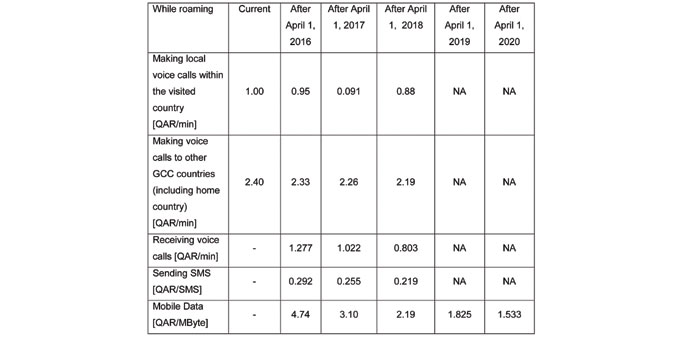The Communication Regulatory Authority (CRA) of Qatar is putting in place necessary regulatory instruments to ensure the effective implementation of the decision by the Gulf Co-operation Council (GCC) Ministerial Committee for Post, Telecommunications and Information Technology to reduce roaming charges in the member states.
Service providers in Qatar already have special roaming packages, particularly aimed at those customers who extensively use roaming mobile and data services abroad. The new regulation will reduce rates for roaming, telephone calls, text messaging and data services throughout the GCC countries, even for customers who only need limited access to roaming services.
The reduction in roaming charges is a continuation of the collaboration and co-operation between the GCC regulators, under the auspices of the GCC General Secretariat.
The first roaming regulation was issued in June 2010 and took full effect in February 2012. It covered roaming voice calls but excluded other roaming services such as mobile data and SMS.
The new regulation, a result of comprehensive study and public consultation by the GCC Roaming Working Group, addresses this gap.
“We are committed to promoting market competition, and bringing additional benefits to consumers,” said Mohamed Ali al-Mannai, president of the CRA. “This initiative is in line with CRA’s mandate to boost affordable state-of-the-art and innovative technology and telecommunications services in Qatar,” he added.
Announced by the GCC Ministerial Committee for Post, Telecommunications and Information Technology during its 24th meeting held in Doha in June reduced roaming rates for voice calls, SMS, and mobile data services will be effective April 1, 2016.
The reductions in roaming charges on both the inter-operator wholesale level and end-user retail level will take place gradually, over a three years period, for voice calls and SMS services, and over a five years period for mobile data services.
To implement this decision, CRA is announcing the specific price ceilings for voice calls, SMS services and mobile data services. The service providers are free to set prices below these regulatory caps. Some of the current local retail charges for voice calls are lower than the GCC price ceilings. Additionally there are promotions such as roaming “Passport” packages, which are useful for specific consumer roaming needs.
The CRA will continue to promote competition in the sector, increase customer benefits, and boost the availability of advanced, innovative and reliable telecommunications services across the state.
The CRA is the Communications Regulator in Qatar established by virtue of Emiri Decree (42) in 2014.
CRA regulates the Telecommunications and Information Technology sector, postal services, access to digital media and spectrum. The CRA encourages and supports an open and competitive Information & Communications Technology (ICT) sector that provides advanced, innovative, and reliable communications services. Balancing the rights of consumers with the need of service providers is at the heart of everything the CRA does.
EU strikes deal to scrap roaming fees
The European Union (EU) yesterday reached a preliminary deal to abolish mobile roaming charges across the 28-country bloc by June 2017 and to require telecom operators to treat all Internet traffic equally. The draft agreement for the end of roaming surcharges on June 15, 2017, marks an important step in the EU’s plan to overhaul the continent’s digital market to boost growth and catch up with the US and Asia.
However, consumer groups gave the news a lukewarm reception, saying network operators would be able to limit the amount of surcharge-free roaming due to a “fair use” clause designed to stop users permanently roaming with a cheaper foreign contract.
The deal, struck between EU lawmakers and Latvia, which holds the rotating EU presidency, will require approval from the European Parliament and EU member states, some of whom have not wanted roaming charges abolished until December 2018. In an interim move, roaming charges will drop in April 2016, with maximum surcharges of 0.05 euros per minute of a call or megabyte of data and 0.02 euros per text sent. That will make the maximum roaming charge about 75% cheaper than under current tariff caps, the Commission said.

Retail price ceilings that will take effect on April 1, 2016 for voice calls, SMS, and mobile data roaming services.
